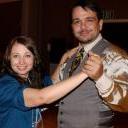

CV75
-
Posts
1784 -
Joined
-
Last visited
-
Days Won
3
Reputation Activity
-
 CV75 got a reaction from seashmore in Trials, Strength, and Relief
CV75 got a reaction from seashmore in Trials, Strength, and Relief
I think fasting about their needs might help inform you as what to pray for (which is guided by the Spirit), but also putting their name on the prayer roll might help cover all bases. The final "But..." is covered by praying that the Lord's will be done.
-
 CV75 got a reaction from askandanswer in Isaiah 24:5
CV75 got a reaction from askandanswer in Isaiah 24:5
1) I think they are the same from looking at many lds.org sources. The "new" is added only in three D&C references, two in relation to marriage and one in relation to the restoration (D&C 22:1), and I think only for emphasis that it is a new revelation in this dispensation.
2) I think in these cases it means to change without authority, as happened in institutional apostasy with every dispensation but this one.
-
 CV75 got a reaction from SpiritDragon in Isaiah 24:5
CV75 got a reaction from SpiritDragon in Isaiah 24:5
Yes, baptism cannot change because it is explicitly part of the doctrine of Christ, "doctrine" being one of the kinds of ordinances and which specifically ties to the law of the redemption (which many times is mentioned as having been established "from the foundation of the world"). Alma ties the doctrine of Christ to the redemption in Mosiah18 (look for faith, repentance, baptism, pouring out His Spirit, keeping the commandments); Alma 19 also (in connection with 18:39).
I think the key is to identify those ordinances (i.e. rites, laws, principles, and decrees) which were instituted from or before the foundation of the world. These cannot change. Another one is the Priesthood (Alma 13:7; D&C 130:20; 132:28).
As indicated in the Old Testament, "everlasting covenants" can be implemented in this world and not have been established before the foundation of the world. Sometimes I think "an everlasting" covenant differentiates these (and sometimes is used to describe the source, as in D&C 19:7-10), from "the everlasting covenant."
This is why we often see change in certain rites (water for wine; temple particulars and clothing) and priesthood structures but not power (changes in the organization of the seventies over the years) that were not instituted from before the foundation of the world but yet require priesthood keys to administer.
-
 CV75 got a reaction from SpiritDragon in Isaiah 24:5
CV75 got a reaction from SpiritDragon in Isaiah 24:5
There are many great articles and lessons on this topic, but basically the new and everlasting covenant is the fulness of the gospel of Jesus Christ, “new” because it has been revealed or restored in each dispensation, and it is “everlasting” because the Lord never changes. The covenant is also a contract between God and man (we agree to keep all the commandments and observe every ordinance of salvation, and God agrees to share with man eternal life in return).
“Ordinance” means two things: tangible rites (which we commonly call ordinances) and intangible decrees (principles and laws). For example, Joseph Smith taught (History of the Church, 5:423, 424):
Page 423: “It was the design of the councils of heaven before the world was, that the principles and laws of the priesthood should be predicated upon the gathering of the people in every age of the world. … Ordinances [principles and laws] instituted in the heavens before the foundation of the world, in the priesthood, for the salvation of men, are not to be altered or changed. All must be saved on the same principles.”
Page 424: “One of the ordinances [rites] of the house of the Lord is baptism for the dead. God decreed before the foundation of the world that that ordinance [that specific rite] should be administered in a font prepared for that purpose in the house of the Lord.”
The only rites (tangible ordinances) I can think of that aren’t subject to alteration by the Lord’s servants would be 1) baptism for the dead, since it is the only ordinance mentioned in scripture as “instituted from before the foundation of the world” (D&C 124:33); 2) marriage since it was instituted before the Fall and carried into this world; and 3) baptism since it is explicitly named as part of the “doctrine (which is a principle) of Christ.” The intangible laws, which on the other hand are many, were also instituted before the foundation of the world (D&C 132: 5)
Every other rite besides the three I mentioned seems to have been instituted according to the Lord’s instructions in this world according to the circumstances and demands of the dispensation, time and place; the objects and protocols involved are necessary only for that dispensation, time and place, and these are revealed through the prophets. The laws are observed by the prophets through the keys they possess, even though their form and manner of expression may change from time to time (with exception of marriage, baptism for the dead, and baptism).
-
 CV75 got a reaction from Sunday21 in Premortal Life?
CV75 got a reaction from Sunday21 in Premortal Life?
God did not force us; He presented a plan and we chose to obtain bodies. Not all of us sin (infants for example do not sin), so that was not a foregone conclusion. All of us die, and that is the really the relevant concern, or, "Why would God ask us to die?" John 12:24 gives us the answer: "Verily, verily, I say unto you, Except a corn of wheat fall into the ground and die, it abideth alone: but if it die, it bringeth forth much fruit." This has to do with the eternal truth that there must be an opposition in all things:
“For it must needs be, that there is an opposition in all things. If not so, my first-born in the wilderness, righteousness could not be brought to pass, neither wickedness, neither holiness nor misery, neither good nor bad. Wherefore, all things must needs be a compound in one; wherefore, if it should be one body it must needs remain as dead, having no life neither death, nor corruption nor incorruption, happiness nor misery, neither sense nor insensibility. Wherefore, it must needs have been created for a thing of naught; wherefore there would have been no purpose in the end of its creation. Wherefore, this thing must needs destroy the wisdom of God and his eternal purposes, and also the power, and the mercy, and the justice of God. And if ye shall say there is no law, ye shall also say there is no sin. If ye shall say there is no sin, ye shall also say there is no righteousness. And if there be no righteousness there be no happiness. And if there be no righteousness nor happiness there be no punishment nor misery. And if these things are not there is no God. And if there is no God we are not, neither the earth; for there could have been no creation of things, neither to act nor to be acted upon; wherefore, all things must have vanished away. And now, my sons, I speak unto you these things for your profit and learning; for there is a God, and he hath created all things, both the heavens and the earth, and all things that in them are, both things to act and things to be acted upon. And to bring about his eternal purposes in the end of man, after he had created our first parents, and the beasts of the field and the fowls of the air, and in fine, all things which are created, it must needs be that there was an opposition; even the forbidden fruit in opposition to the tree of life; the one being sweet and the other bitter.”
But there is nothing wrong with accepting the teaching of pre-mortal life on faith alone, and certainly nothing wrong with understanding the Biblical references that do exist on the subject. And certainly nothing wrong with reading and understanding and praying about the the truthfulness of the Book of Mormon!
-
 CV75 got a reaction from Sunday21 in Premortal Life?
CV75 got a reaction from Sunday21 in Premortal Life?
I think if you read the entire chapter and the related scripture links, and the entire passage from which you selected the isolated statements, you will have the context, understanding and elaboration you seek.
-
 CV75 got a reaction from Just_A_Guy in God is a Christ and he's not our Father (question)
CV75 got a reaction from Just_A_Guy in God is a Christ and he's not our Father (question)
Regarding the logic of #2: In the Adam-God teaching there is a head of all gods (Elohim), and these include gods that are called Jehovahs, who are heads of other gods (one of whom is Michael, who is both Heavenly Father and Adam). The following passages are completely illogical when read with an eye that the characters follow this construct: Moses 6:50-54; Moses 1:32-34; Moses 4: 28, 29.
In addition, things go way off the rails with Enoch receiving his revelation in Moses 6 in light of what D&C 107:48-49 says about the timing of things. According to the D&C passage, Adam was yet mortal when Enoch received his revelation in Moses 6, So Adam could not have been speaking to Enoch in Moses 6:26-28, calling him “my son” and explaining his history and relationship with his forefather Adam -- i.e. himself -- (as also detailed in verses 50-68) at the same time. Adam was 622 years old when Enoch was born, 647 when he ordained Enoch (at age 25), and 687 when he blessed Enoch (at age 65; D&C 107:48); Adam lived another 243 years, and with Enoch walking with God for 365 years until he was taken up at 430 years old (D&C 107:49; year 1052), Enoch had to have had his vision prior to Adam departing the earth at age 930. Adam could not have been in two estates at the same time.
-
 CV75 got a reaction from The Folk Prophet in God is a Christ and he's not our Father (question)
CV75 got a reaction from The Folk Prophet in God is a Christ and he's not our Father (question)
We also covenant to lay down our lives and will take it up just as Jesus and His Father did; we do this through the merits of Jesus Christ, receiving grace for grace until we receive a fulness. Because of how grace works, the merits and works of the beneficiary are not as important as the fact that they exist in the Savior, with Whom we are to become One.
-
 CV75 got a reaction from The Folk Prophet in God is a Christ and he's not our Father (question)
CV75 got a reaction from The Folk Prophet in God is a Christ and he's not our Father (question)
A couple of things to consider:
RE: Fact #4, “basically” does not a fact make. We are all able to become saviors on Mount Zion, and Our Father must have been one also, if not a Christ.
RE: Assumption #3, the Father did not cause the Son’s pain in the Garden of Gethsemane; the consequences of sin did. President Packer said, “[Jesus] faced the awesome power of the evil one, who was not confined to flesh nor subject to mortal pain. That was Gethsemane!” https://www.lds.org/ensign/2008/03/who-is-jesus-christ?lang=eng Therefore, a savior on Mount Zion, once exalted, can bring forth a Christ.
Jesus said, “The Son can do nothing of himself, but what he seeth the Father do: for what things soever he doeth, these also doeth the Son likewise (John 5:19).” I believe this has more to do with receiving grace for grace (and using that grace to bless) until He received a fullness of the Father, than defining His role as Christ. This is why he said, “Be ye therefore perfect, even as your Father which is in heaven is perfect” as a mortal, and expandedon this theme with, “Therefore I would that ye should be perfect even as I, or your Father who is in heaven is perfect” as a resurrected being.
-
 CV75 got a reaction from zil in God is a Christ and he's not our Father (question)
CV75 got a reaction from zil in God is a Christ and he's not our Father (question)
A couple of things to consider:
RE: Fact #4, “basically” does not a fact make. We are all able to become saviors on Mount Zion, and Our Father must have been one also, if not a Christ.
RE: Assumption #3, the Father did not cause the Son’s pain in the Garden of Gethsemane; the consequences of sin did. President Packer said, “[Jesus] faced the awesome power of the evil one, who was not confined to flesh nor subject to mortal pain. That was Gethsemane!” https://www.lds.org/ensign/2008/03/who-is-jesus-christ?lang=eng Therefore, a savior on Mount Zion, once exalted, can bring forth a Christ.
Jesus said, “The Son can do nothing of himself, but what he seeth the Father do: for what things soever he doeth, these also doeth the Son likewise (John 5:19).” I believe this has more to do with receiving grace for grace (and using that grace to bless) until He received a fullness of the Father, than defining His role as Christ. This is why he said, “Be ye therefore perfect, even as your Father which is in heaven is perfect” as a mortal, and expandedon this theme with, “Therefore I would that ye should be perfect even as I, or your Father who is in heaven is perfect” as a resurrected being.
-
 CV75 got a reaction from Sunday21 in How do we ask questions at church?
CV75 got a reaction from Sunday21 in How do we ask questions at church?
Bring the Holy Ghost with you, then speak.
-
 CV75 got a reaction from Jane_Doe in How do we ask questions at church?
CV75 got a reaction from Jane_Doe in How do we ask questions at church?
Bring the Holy Ghost with you, then speak.
-
 CV75 got a reaction from zil in How do we ask questions at church?
CV75 got a reaction from zil in How do we ask questions at church?
Bring the Holy Ghost with you, then speak.
-
 CV75 got a reaction from Just_A_Guy in Refusing To Make The Cake
CV75 got a reaction from Just_A_Guy in Refusing To Make The Cake
I think our system of government allows that each State can decide what constitutes public accommodation and religious conscience exemption, so these decisions need to be made jurisdiction by jurisdiction. Sometimes compromise is the result, and the Church masterfully exemplified how to graciously participate in the process and accept the compromise even if not getting 100% of what is sought (see: http://www.deseretnews.com/article/865623399/Utah-lawmakers-unveil-anti-discrimination-religious-rights-legislation.html ).
The Supreme Court can offer constitutional interpretation when needed, but hopefully we can agree as a community before it reaches that point. For me, broadly protecting religious freedom with appropriate tests for proving conscience comes before identifying and protecting specific points of public accommodation. To me, an "amenity" is a convenience that does not rise to the level of being essential to maintaining and protecting the essentials of our Constitution:our union structure, justice, domestic peace, defense from outside forces, general welfare, or the blessings of liberty to us and our posterity. Religious freedom does actually contribute to and even helps define these goals.
Allowing people to accommodate their amenities in the marketplace is actually a good way to ensure diversity and need not be divisive.
-
 CV75 got a reaction from askandanswer in Similarity in rewards?
CV75 got a reaction from askandanswer in Similarity in rewards?
Looking at these verses alone, the first shows an attitude of taking something away from God, or bringing Him down; the second and attitude of giving and sharing; the third an attitude of submission followed by receiving a gift. In the first, honor is taken away in a deal; in the second honor is granted in love; in the third honor is shared.
-
 CV75 got a reaction from cdowis in Ordained an Elder vs. Temple Endowment question
CV75 got a reaction from cdowis in Ordained an Elder vs. Temple Endowment question
Not currently. I do not know about 13 years ago, but it seems the bishop permitted it. I think that if the father questioned it, he should have discussed the matter with the bishop first. That might have allowed him time to think twice about confronting his son about it.
-
 CV75 got a reaction from my two cents in Correction in the church
CV75 got a reaction from my two cents in Correction in the church
I think PPIs are appropriate venues for leaders to address these matters, as well as presidency councils, sometimes ward-level councils. Decisions to give quorum lessons are sometimes in order if it is a common problem. Strong individual correction needs to be based on an equally strong relationship with equally strong love for the person (D&C 121:43).
-
 CV75 got a reaction from mirkwood in Correction in the church
CV75 got a reaction from mirkwood in Correction in the church
I think PPIs are appropriate venues for leaders to address these matters, as well as presidency councils, sometimes ward-level councils. Decisions to give quorum lessons are sometimes in order if it is a common problem. Strong individual correction needs to be based on an equally strong relationship with equally strong love for the person (D&C 121:43).
-
 CV75 got a reaction from mordorbund in Correction in the church
CV75 got a reaction from mordorbund in Correction in the church
I think PPIs are appropriate venues for leaders to address these matters, as well as presidency councils, sometimes ward-level councils. Decisions to give quorum lessons are sometimes in order if it is a common problem. Strong individual correction needs to be based on an equally strong relationship with equally strong love for the person (D&C 121:43).
-
 CV75 got a reaction from Fether in Correction in the church
CV75 got a reaction from Fether in Correction in the church
I think PPIs are appropriate venues for leaders to address these matters, as well as presidency councils, sometimes ward-level councils. Decisions to give quorum lessons are sometimes in order if it is a common problem. Strong individual correction needs to be based on an equally strong relationship with equally strong love for the person (D&C 121:43).
-
 CV75 got a reaction from askandanswer in Doctrine and Covenants 110:12 and keys
CV75 got a reaction from askandanswer in Doctrine and Covenants 110:12 and keys
The header to Section 110 refers to "their keys and dispensations" (for Moses and Elias) and "keys of his dispensation" (for Elijah). Peter, James and John had already given the keys of the dispensation of the fulness of times (D&C 128:20), and all other heads of dispensations at some point also did the same (verse 21 -- Michael, Gabriel, Raphael, and other divers angels, "declaring" and "giving"). It seems to me that the key of a dispensation is a functional key in and of itself. The keys of the kingdom, which Peter, James and John also restored, and which are also functional, are what get delegated through the priesthood order under the direction of the President of the Church, under Christ. I don't see the keys of the dispensation(s) being delegated (they are retained by the Prophet, Seer and Revelator), but the keys of the kingdom within that dispensation can be delegated by him according to the order of the priesthood. Both sets of keys of course are held by the First Presidency and Twelve according to the succession plan.
-
 CV75 got a reaction from Sunday21 in Blessings of Being LDS
CV75 got a reaction from Sunday21 in Blessings of Being LDS
Yes, knowing that and knowing what to do with that knowledge, sooner than later, is a tremendous blessing and privilege.
-

-
 CV75 got a reaction from NightSG in Ordained an Elder vs. Temple Endowment question
CV75 got a reaction from NightSG in Ordained an Elder vs. Temple Endowment question
Not currently. I do not know about 13 years ago, but it seems the bishop permitted it. I think that if the father questioned it, he should have discussed the matter with the bishop first. That might have allowed him time to think twice about confronting his son about it.
-
 CV75 got a reaction from CoulsonW in The War in Heaven
CV75 got a reaction from CoulsonW in The War in Heaven
I think the same ideas promulgated by Sherem (Jacob Chapter 1), Nehor (Alma 1), Korihor (Alma 30), Gadianton (Helaman 2 & 6) and Giddianhi (3 Nephi 3) in the Book of Mormon have corresponding versions, some of them verbatim, today. The words of God in countering them is also shared in these same chapters.













